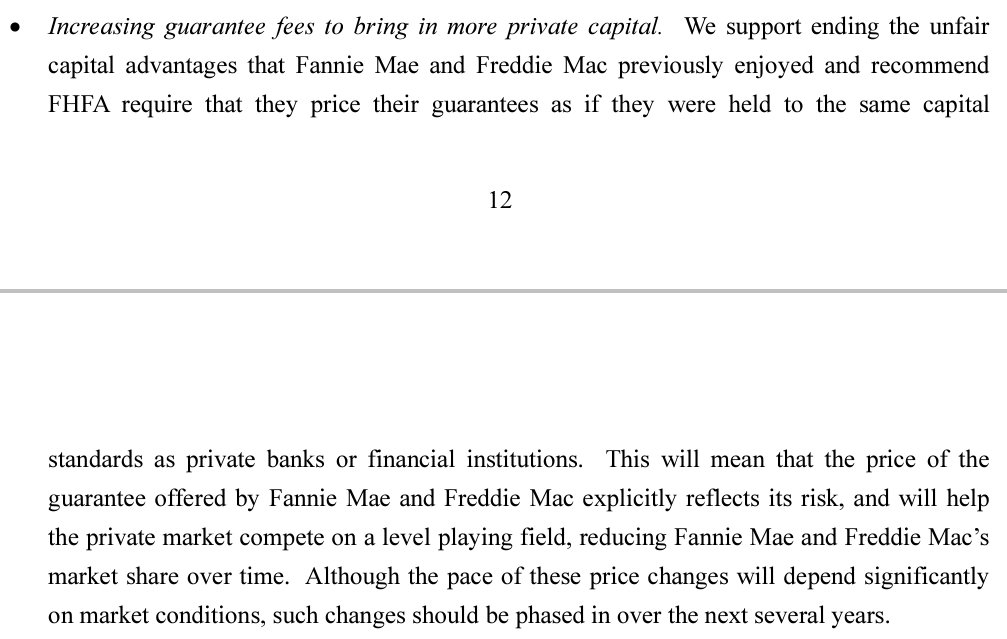Sunday, March 24, 2024 3:37:24 AM
In early conservatorship, it was criticized for what it calculated as "subsidy cost" in FnF for delivering a guarantee fee below the one it would charge the fully private sector, as required in the Charter Act (actions related to Secondary Mortgage Market operations: section Purposes). This cost was then charged on the Federal Budget.
But this is when FnF charged 28 bps g-fee on average and during the period increasing the guarantee fees through today that charge around 62 bps g-fee on new acquisitions, pursuant to the UST 2011 Report to Congress in light of the request by the Dodd-Frank law of "recommendations on ending the conservatorships".

Therefore, there is no subsidy anymore and subsequent "subsidy cost" on the Federal Budget.
Since then, the CBO turned into a branch of the investment banks, calling for the Warrant exercised, Equity restructuring, etc. Clearly, it isn't knowledgeable about the affairs during the conservatorship (laws, rules and basic finance dynamics) and I no longer read anything that comes from the CBO. This is like listening to a Chinese in a karaoke bar singing in English. I can't take no more!
On the other hand, the Office of Management and Budget (OMB) of the White House, treats FnF different. The accounting of FnF is simple: cash outlays and cash inflows.
However, you have posted what it looks like the CBO is continuing to charge a cost on the Federal Budget even without the prior "subsidy cost" caused by a subsidized guarantee fee, increasing the Deficit in $43.4 billion during a 10-year period.
The CBO continues to claim that it's "related to subsidies for mortgage loans purchased and securitized by Fannie Mae and Freddie Mac" without specifying what subsidy it's talking about, because there is none, and linking it to the Conservatorship, when it's a status that preserves their legal status of private shareholder-owned enterprises and FnF have been operating business as usual all along.
The Congressional Budget Office’s baseline includes $43.4 billion in mandatory spending during the FY 2023–FY 2032 period related to subsidies for mortgage loans purchased and securitized by Fannie Mae and Freddie Mac. Ending the conservatorships of Fannie Mae and Freddie Mac would reduce mandatory budget authority by $43.4 billion during the FY 2023–FY 2032 period.
At least, we know that unwinding the Separate Account would come with a windfall in the Federal Budget of $43B thanks to the accounting shenanigans from the CBO, which is fantastic for the scenario "as is" or "takeover", where the UST wouldn't make any profit (cumulative SPS dividend is netted out with the interests owed to FnF on the $152B due).
As a reminder, a "Taking + resale" scenario comes with a whopping $178B profit for the UST.
Avant Technologies Engages Wired4Tech to Evaluate the Performance of Next Generation AI Server Technology • AVAI • May 23, 2024 8:00 AM
Branded Legacy, Inc. Unveils Collaboration with Celebrity Tattoo Artist Kat Tat for New Tattoo Aftercare Product • BLEG • May 22, 2024 8:30 AM
"Defo's Morning Briefing" Set to Debut for "GreenliteTV" • GRNL • May 21, 2024 2:28 PM
North Bay Resources Announces 50/50 JV at Fran Gold Project, British Columbia; Initiates NI 43-101 Resources Estimate and Bulk Sample • NBRI • May 21, 2024 9:07 AM
Greenlite Ventures Inks Deal to Acquire No Limit Technology • GRNL • May 17, 2024 3:00 PM
Music Licensing, Inc. (OTC: SONG) Subsidiary Pro Music Rights Secures Final Judgment of $114,081.30 USD, Demonstrating Strength of Licensing Agreements • SONGD • May 17, 2024 11:00 AM










